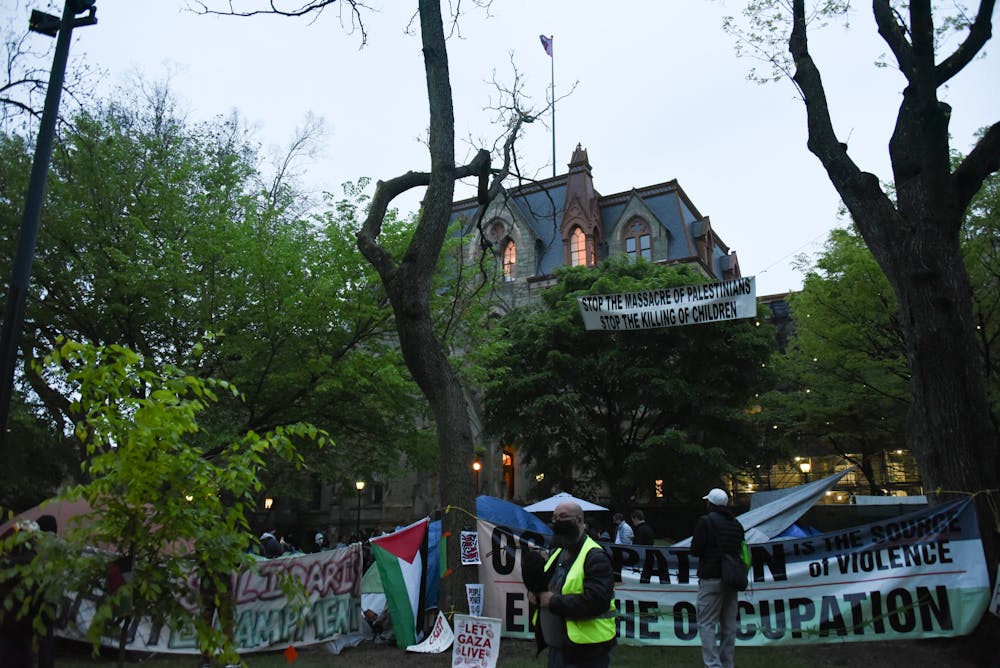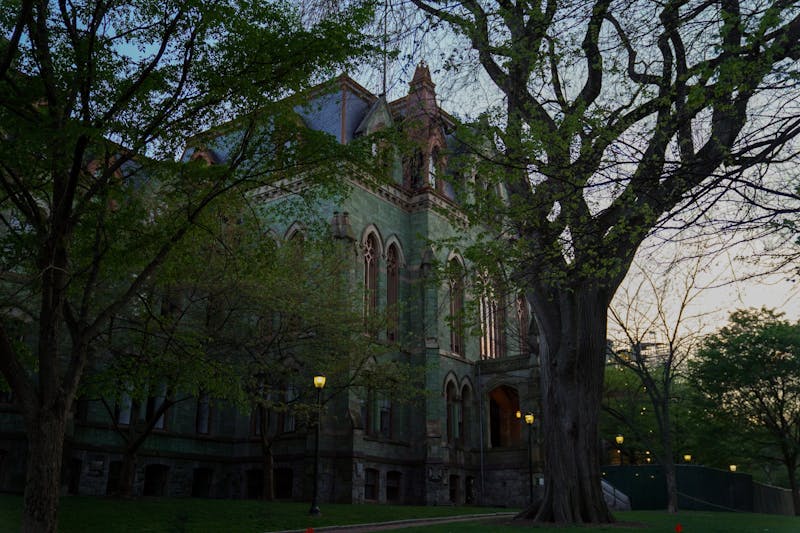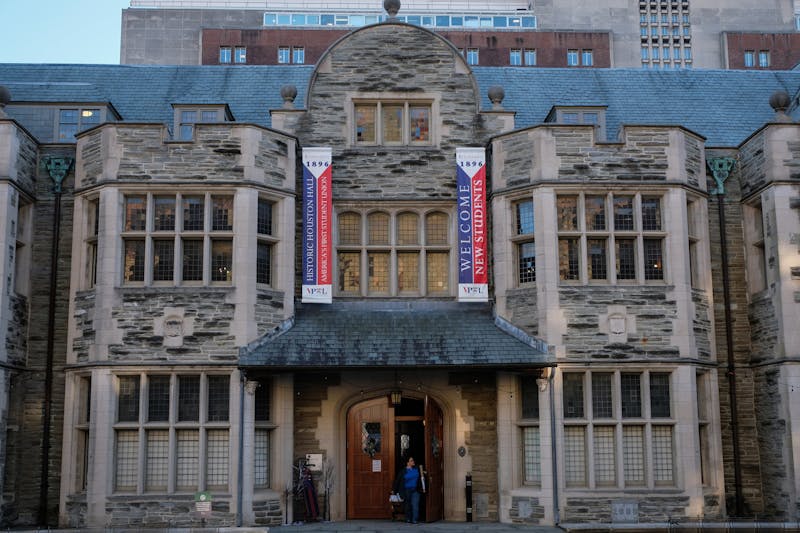
As calls for universities to provide increased transparency into their investments grow across the country, The Daily Pennsylvanian looked into what disclosure and divestment mean and how Penn manages its $21 billion endowment.
The 'Gaza Solidarity Encampment' — which is now continuing into its fourth day — has called for transparency of Penn’s investments in its three demands posted in a Thursday statement on Instagram.
The first demand is for Penn to disclose its financial holdings under the Associated Investments Fund “in the spirit of transparency and shared governance.” The statement also calls for Penn to divest financially from “corporations that profit from Israel’s war on Gaza and occupation in Palestine” and to condemn the “scholasticide” of Palestinian scholars and universities.
The final demand urges the University to defend Palestinian students and withdraw its disciplinary actions against pro-Palestinian activists, including the ban on Penn Students Against the Occupation of Palestine’s student group status.
For over a decade, various Penn-affiliated groups have campaigned for the University to cut ties with companies for political, social, and humanitarian reasons. The University has established guidelines in place for community members to advocate for divestment from specific holdings.
University investments
The Associated Investments Fund is the pooled investment vehicle for the majority of Penn’s endowment, which totaled $21 billion as of June 2023. AIF holds investments in several types of assets, including short term, equity, private equity, and real assets.
The fund is overseen by the Penn Office of Investments and managed according to policies established by the Investment Board, which is appointed by the University Board of Trustees. The current Investment Board consists of six Penn alumni, along with Interim Penn President Larry Jameson and Board of Trustees Chair Ramanan Raghavendran as ex officio members.
Raghavendran declined to comment on the protesters’ demands for disclosure and divestment.
Penn does not publicly disclose specific holdings under the AIF. According to the University’s most recent financial statement, the total return on investments under the AIF was $268 million for the year ending June 30, 2023.
Penn faculty, students, alumni, and staff may present a proposal for divestment based on social responsibility concerns. The proposal must meet several criteria, including showing “a moral evil implicating a core University value that is creating a substantial social injury” and identifying companies that “have a significant, clear, and undeniable nexus to the moral evil.”
The proposal must also “have the support of a broad and sustained consensus of the University community reflected over a sustained period of time,” according to the guidelines.
After the University Council Steering Committee receives a divestment proposal, it can reject the proposal or refer it to an Ad Hoc Advisory Committee on Divestment for further consideration. According to the website, Penn has an “extraordinarily high standard” for divestment and should only adopt that route after exhausting all other courses of action to address the community’s concerns.
The Board of Trustees recognizes that divestment may be appropriate in “extraordinary circumstances,” according to the University Secretary website. In these cases, Penn may divest from identified securities on an unconditional basis or for a limited period of time.
Chief Investment Officer Peter Ammon and other Investment Board members did not respond to a request for comment on the encampment’s demands for disclosure of AIF holdings and divestment.
Growing calls for investment reform
Divestment campaigns have come to the forefront of student debates — both at Penn and college campuses nationwide — over administrative responses to Israel’s war in Gaza.
On Friday, Penn’s student government approved a referendum for the undergraduate student body to vote on whether the University should divest from Israel. The petition, which was circulated on April 24 by Penn’s Muslim Students Association and reposted by PAO, asks whether the University should divest its endowment fund from companies and organizations that “profit from, engage in, or contribute to the government of Israel’s human rights violations.”
The petition also asks if Penn should disclose all investments held through its endowment fund and cut ties with Ghost Robotics, a spinout that develops four-legged robots to be used for "data collection, intelligence, security, asset protection, and military-specific uses." On April 5, a group of around 120 Penn community members protested the company, alleging that it is selling robots to Israel's military for use in the ongoing conflict in Gaza.
Ghost Robotics is housed in the 23-acre Pennovation Works property located at 3401 Grays Ferry Avenue. Ghost Robotics — which did not respond to a request for comment — is listed as a participant in PCI Ventures Impact, a Penn Center for Innovation program that supports early-stage companies.
At the encampment on College Green, organizers handed out flyers with pictures of Ghost Robotics, describing them as “weapons of war made in Philadelphia.” Signs posted around the green called for Penn to cut “all financial, logistical, and academic ties” with the company and evict it from Pennovation Works.
Four Penn history professors expressed support for students’ calls for universities to disclose investments in a column in the DP on Saturday. They wrote that the students’ demands build on a “history of struggles to make ethical choices — as individuals, as communities, as institutions — about what our resources support.”
“It is possible to imagine a world in which the endowments of educational and medical institutions are understood to be different from other pots of money, and are invested only where there is broad agreement that no public harm is being caused,” the professors wrote.
The Penn encampment’s demands align with those made by protesters across college campuses nationwide. Columbia University Apartheid Divest is calling for Columbia to divest from Alphabet, Amazon, and Microsoft, claiming that the companies are "complicit in Israeli occupation."
At Columbia University, hundreds of students have set up tents on the campus lawn, pledging to occupy the space until Columbia divests from companies with ties to Israel’s war in Gaza. Many pro-Palestinian student groups, including the USC Divest from Death Coalition at the University of Southern California, are also calling for transparency of universities’ endowments and investments.
Steven Mintz, professor of history at the University of Texas at Austin, wrote in a statement to the DP that divestment is not a “realistic objective” at many universities.
“I think the parallels that are drawn with divestment from fossil fuels or apartheid are overly simplistic,” he wrote.
Mintz added that universities might take steps to contribute to de-escalation, such as increasing opportunities for dialogue between students.
“One could imagine in the future, campuses working in collaboration to develop new educational institutions in Gaza,” he wrote.
Past activism for divestment
Over the past decade, groups at Penn have sought approval for divestment proposals from the Board of Trustees with varying success.
“Given the Trustees’ fiduciary responsibility, there is a strong presumption against the University making investment decisions based upon political, social, or ethical positions held by members of the community,” the University’s divestment guidelines state.
In 2012, Penn hosted a two-day national conference for Boycott, Divestment, and Sanctions — a pro-Palestinian movement to compel Israel to comply with the movement’s interpretation of international law. Activists from around the country traveled to Penn to listen to keynote speakers and participate in panel discussions and question-and-answer sessions.
Despite widespread debate leading up to the conference, the event passed without incidents of disruption. Penn police and private security forces were present throughout the conference.
The University, which did not sponsor the conference, issued a statement at the time that it “does not support sanctions or boycotts against Israel.”
Fossil Free Penn has repeatedly demanded that the University divest from the fossil fuel industry. In both 2016 and 2018, Penn rejected an FFP proposal to remove holdings in top fossil fuel companies and reinvest in renewable energy. In September 2022, FFP set up an 39-day encampment on College Green with three demands for Penn, including a total divestment from fossil fuels.
In November 2022, Penn announced that it holds no direct investments in fossil fuel companies. FFP coordinators continued to call for the University to divest from its indirect holdings as well.
In 2014, the Board considered a proposal to divest from tobacco stocks, ultimately concluding that it did not meet the necessary criteria.
“The linchpin of any divestment decision at Penn rests on the interpretation of moral evil, which we would view as an activity such as genocide or apartheid,” the Board wrote at the time.
In 2023, Amnesty International graded 10 of the nation’s largest investment offices on the adequacy of their human rights due diligence processes for venture capital investing. Penn received a “D” — based primarily on its lack of Environmental and Social Corporate Governance action and for the limited nature of its public disclosures, according to the report. Amnesty International created its scoring using publicly available documents on university websites.
Alternative actions to divestment
If the Board of Trustees decides not to move forward with a divestment proposal, Penn provides alternative ways through which the University can address social responsibility concerns. These options include communicating the University’s view using the proxy voting process, which allows shareholders to vote on decisions affecting the corporation in question.
Penn’s Social Responsibility Advisory Committee makes recommendations to the Board of Trustees regarding proxy voting. The 12-person committee evaluates how the University should vote when company shareholders submit resolutions regarding corporate conduct and transparency.
College senior Charlie Schumer, who is a member of SRAC, told the DP that the committee is not involved with Penn’s investment decisions. Rather, he said that SRAC looks at companies that Penn has already invested in and evaluates submitted resolutions based on the University’s “adopted positions,” such as support for same sex partner benefits.
“A lot of the proposals that we're likely to support are about having certain disclosures, or providing more information to the investors, or having a company provide public information, rather than saying that our company needs to take a certain action,” Schumer said.
The SRAC website lists 17 categories that it uses to evaluate proxy voting on social issues, which include global labor standards, human rights, and sustainability reporting.
Staff Reporter Max Annunziata contributed reporting for this article.
The Daily Pennsylvanian is an independent, student-run newspaper. Please consider making a donation to support the coverage that shapes the University. Your generosity ensures a future of strong journalism at Penn.
Donate









